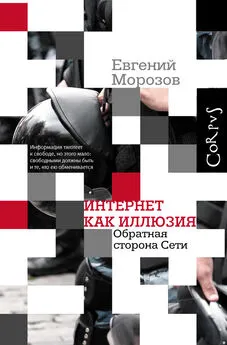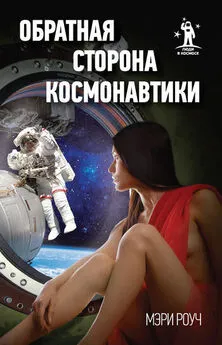Евгений Морозов - Интернет как иллюзия. Обратная сторона сети
- Название:Интернет как иллюзия. Обратная сторона сети
- Автор:
- Жанр:
- Издательство:Array Литагент «Corpus»
- Год:2014
- Город:Москва
- ISBN:978-5-17-084792-1
- Рейтинг:
- Избранное:Добавить в избранное
-
Отзывы:
-
Ваша оценка:
Евгений Морозов - Интернет как иллюзия. Обратная сторона сети краткое содержание
Интернет как иллюзия. Обратная сторона сети - читать онлайн бесплатно полную версию (весь текст целиком)
Интервал:
Закладка:
Watts, J. Old Suspicions Magnified Mistrust into Ethnic Riots in Urumqi // Guardian, July 10, 2009.
Weiss, L. Globalization and National Governance: Antinomy or Interdependence? // Review of International Studies 25 (1999): 59–88.
Weiss, L. Globalization and the Myth of the Powerless State // New Left Review 225 (1997): 3–27.
Weiss, L. The Myth of the Powerless State . Ithaca, NY: Cornell Univer-sity Press, 1998.
Zuev, D. The Movement Against Illegal Immigration: Analysis of the Central Node in the Russian Extreme-Right Movement // Nations and Nationalism 16, no. 2 (2010): 261–284.
Глава 10. История – это не только меню браузераAchterhuis, H., ed. American Philosophy of Technology: The Em-pirical Turn . Bloomington: Indiana University Press, 2001.
Adas, M. Machines as the Measure of Men: Science, Technology, and
Ideologies of Western Dominance . Ithaca, NY: Cornell University Press, 1990.
Alexander, J. The Sacred and Profane Information Machine: Dis-course About the Computer as Ideology // Archives de sciences so-ciales des religions 35, no. 69 (1990): 161–171.
Alvarez, M. R. Modern Technology and Technological Determinism:
The Empire Strikes Again // Bulletin of Science, Technology & So-ciety 19, no. 5 (1999): 403.
Armitage, J. Resisting the Neoliberal Discourse of Technology: The Po-litics of Cyberculture in the Age of the Virtual Class // CTHEORY 1 (1999).
Balabanian, N. On the Presumed Neutrality of Technology // IEEE
Technology and Society Magazine 25, no. 4 (2006): 15–25. Barbrook, R., and A. Cameron The Californian Ideology // Science as Culture 6, no. 1 (1996): 44–72.
Barley, S. R. What Can We Learn from the History of Technology? //
Journal of Engineering and Technology Management 15, no. 4 (1998): 237–255.
Behringer, W. Introduction: Communication in Historiography //
German History 24, no. 3 (2006): 325.
Beniger, J. R. Control Revolution: Technological and Economic Ori-gins of the Information Society . Cambridge, MA: Harvard University Press, 1989.
Bijker, W. E., Hughes, T. P., and T. J. Pinch, eds. The So-cial Construction of Technological Systems: New Directions in the Sociology and History of Technology . Cambridge, MA: MIT Press, 1989.
Bimber, B. Karl Marx and the Three Faces of Technological Determi-nism // Social Studies of Science (1990): 333–351.
Blondheim, M. News over the Wires: The Telegraph and the Flow of Public Information in America, 1844–1897. Cambridge, MA: Harvard University Press, 1994.
Boccaccio, G. The Decameron , Vol. 1. New York: Modern Library, 1955.
Boorstin, D. J. The Republic of Technology . New York: HarperCol-lins, 1979.
Briggs, A., and P. Burke A Social History of the Media: From
Gutenberg to the Internet . 2nd ed. Malden, MA: Polity, 2005. Cardwell, D. Wheels, Clocks, and Rockets: A History of Technology .
New York: W. W. Norton, 1995.
Carey, J., and J. J. Quirk The Mythos of the Electronic Revolution // American Scholar 39, no. 1 (1970).
Carnes, M. C. The Columbia History of Post-World War II America . New York: Columbia University Press, 2007.
Ceruzzi, P. E. Moore’s Law and Technological Determinism // Tech-nology and Culture 46, no. 3 (2005): 584–593.
Comor, E. Harold Innis and “the Bias of Communication” // Infor-mation, Communication and Society 4, no. 2 (2001): 274–294. Corn, J. J. The Winged Gospel: America’s Romance with Aviation .
Baltimore: Johns Hopkins University Press, 2002.
Cortada, J. W. Do We Live in the Information Age? Insights from His-toriographical Methods // Historical Methods: A Journal of Quan-titative and Interdisciplinary History 40, no. 3 (2007): 107–116.
Cowan, R. S. More Work for Mother: The Ironies of Household Tech-nology from the Open Hearth to the Microwave . New York: Basic Books, 1983.
Craig, D. B. Fireside Politics: Radio and Political Culture in the United States, 1920–1940. Baltimore: Johns Hopkins University Press, 2005.
Czitrom, D. J. Media and the American Mind: From Morse to McLuhan . Chapel Hill: University of North Carolina Press, 1982.
David, P. A. The Dynamo and the Computer: An Historical Perspec-tive on the Modern Productivity Paradox // American Economic Review 80, no. 2 (1990): 355–361.
de la PeÑa, C. “Slow and Low Progress”, or Why American Studies Should Do Technology // American Quarterly 58 (2006): 915–941.
de la PeÑa, C., and S. Vaidhyanathan, eds. Rewiring the “Nation”: The Place of Technology in American Studies . Baltimore: Johns Hopkins University Press, 2007.
Diamond, L. Liberation Technology // Journal of Democracy 21, no. 3 (2010): 69–83.
Douglas, S. J. Inventing American Broadcasting, 1899–1922. Baltimore: Johns Hopkins University Press, 1987.
Douglas, S. J. Listening In: Radio and the American Imagination . Minneapolis: University of Minnesota Press, 2004.
Douglas, S. J. The Turn Within: The Irony of Technology in a Globa-lized World // American Quarterly 58, no. 3 (2006): 619–638. Dunlap, O. E., Jr. The Outlook for Television . New York: Harper &
Brothers, 1932.
Durbin, P. T. Technology and Political Philosophy // Technology in Society 6, no. 4 (1984): 315–327.
Elliott, E. D. Against Ludditism: An Essay on the Perils of the (Mis)Use of Historical Analogies in Technology Assessment // Southern California Law Review 65, no. 1 (1991): 279.
Ezrahi, Y., Mendelsohn, E., and H. Segal Technology, Pes-simism, and Postmodernism . Boston: Kluwer Academic, 1994. Feenberg, Andrew Alternative Modernity: The Technical Turn in
Philosophy and Social Theory . Berkeley: University of California Press, 1995.
Feenberg, Andrew Marcuse or Habermas: Two Critiques of Tech-nology // Inquiry 39, no. 1 (1996): 45–70.
Feenberg, Andrew Questioning Technology . New York: Routledge, 1999.
Ferkiss, V. C. Man’s Tools and Man’s Choices: The Confrontation of Technology and Political Science // American Political Science Re-view 67, no. 3 (1973): 973–980.
Ferkiss, V. C. Technology and American Political Thought: The Hid-den Variable and the Coming Crisis // Review of Politics 42, no. 3 (1980): 349–387.
Fischer, Claude S. America Calling: A Social History of the Tele-phone to 1940. Berkeley: University of California Press, 1994. Fischer, E. Contemporary Technology Discourse and the Legitimation of Capitalism // European Journal of Social Theory 13, no. 2
(2010).
Forest, Lee De. Television, Today and Tomorrow . New York: Dial, 1942.
Foster, T. The Rhetoric of Cyberspace: Ideology or Utopia? // Con-temporary Literature 40, no. 1 (1999): 144–160.
Friedel, Robert Douglas A Culture of Improvement: Technology and the Western Millennium . Cambridge, MA: MIT Press, 2007.
Galston, W. A. Does the Internet Strengthen Community? // Natio-nal Civic Review 89, no. 3 (2000): 193–202.
Gane, N. Speed Up or Slow Down? Social Theory in the Information Age // Information, Communication & Society 9, no. 1 (2006): 20–38.
Gladney, G. A. Technologizing of the Word: Toward a Theoretical and Ethical Understanding // Journal of Mass Media Ethics 6, no. 2 (1991): 93–105.
Graham, S., and S. Marvin Planning Cybercities? Integrating Telecommunications into Urban Planning // Town Planning Re-view 70, no. 1 (1999): 89–114.
Grier, David Alan When Computers Were Human . Princeton, NJ: Princeton University Press, 2005.
Grint, K., and S. Woolgar On Some Failures of Nerve in Con-structivist and Feminist Analyses of Technology // Science, Techno-logy & Human Values 20, no. 3 (1995): 286.
Halleck, DeeDee Hand-Held Visions: The Impossible Possibilities of Community Media . New York: Fordham University Press, 2002.
Hand, M., and B. Sandywell E-topia as Cosmopolis or Citadel: On the Democratizing and De-Democratizing Logics of the Internet, or, Toward a Critique of the New Technological Fetishism // Theory, Culture & Society 19, no. 1–2 (2002): 197.
Hannay, N. B., and R. E. McGinn The Anatomy of Modern Tech-nology: Prolegomenon to an Improved Public Policy for the Social Management of Technology // Daedalus 109, no. 1 (1980): 25–53.
Headrick, Daniel R. The Invisible Weapon: Telecommunications and International Politics, 1851–1945. New York: Oxford Univer-sity Press, 1991.
Headrick, Daniel R. The Tools of Empire: Technology and European Imperialism in the Nineteenth Century . New York: Oxford Univer-sity Press, 1981.
Headrick, Daniel R. When Information Came of Age: Technolo-gies of Knowledge in the Age of Reason and Revolution, 1700–1850. New York: Oxford University Press, 2000.
Heidegger, Martin The Question Concerning Technology, and Other Essays . New York: Harper Perennial, 1982.
Henderson, Peter Coal Fuels Much of Internet Cloud, Says Green-peace // Reuters, March 30, 2010.
Herf, J. Technology, Reification, and Romanticism // New German Critique (1977): 175–191.
Hine, C. Internet Research and the Sociology of Cyber-Social-Scientific
Knowledge // Information Society 21, no. 4 (2005): 239–248. Hughes, Thomas P. Human-Built World: How to Think About
Technology and Culture . Chicago: University of Chicago Press, 2004.
Hughes, Thomas P. Lusting for the Gratifications of Technology //
Reviews in American History 14, no. 2 (1986): 265–269. Hughes, Thomas P. The Seamless Web: Technology, Science, Etcetera,
Etcetera // Social Studies of Science 16, no. 2 (1986): 281–292. Ihde, Don Ironic Technics . Copenhagen: Automatic Press, 2008. Introna, L. D. Maintaining the Reversibility of Foldings: Making the
Ethics (Politics) of Information Technology Visible // Ethics and In-formation Technology 9, no. 1 (2007): 11–25.
Jacobs, M., Novak, W. J., and J. E. Zelizer The Democratic Ex-periment: New Directions in American Political History . Princeton, NJ: Princeton University Press, 2003.
Jones, S. Fizz in the Field: Toward a Basis for an Emergent Internet
Studies // Information Society 21, no. 4 (2005): 233–237. Katz-Kimchi, M. Historicizing Utopian Popular Discourse on the
Internet in America in the 1990 s: Positions, Comparison, and Con-textualization . Presentation at The Long History of New Media conference, Montreal, May 22, 2008.
Kenny, Charles Revolution in a Box // Foreign Policy (November 2009).
Khiabany, G. Globalization and the Internet: Myths and Realities // Trends in Communication 11, no. 2 (2003): 137–153.
Kling, R. Reading “All About” Computerization: How Genre Conventions Shape Nonfiction Social Analysis // Information Society 10, no. 3 (1994): 147–172.
Latour, B., and P. Weibel Making Things Public: Atmospheres of Democracy . Cambridge, MA: MIT Press, 2005.
Layton, E. T., Jr. Technology as Knowledge // Technology and Cul-ture (1974): 31–41.
Mackay, H., and G. Gillespie Extending the Social Shaping of Technology Approach: Ideology and Appropriation // Social Studies of Science 22, no. 4 (1992): 685–716.
Читать дальшеИнтервал:
Закладка:










